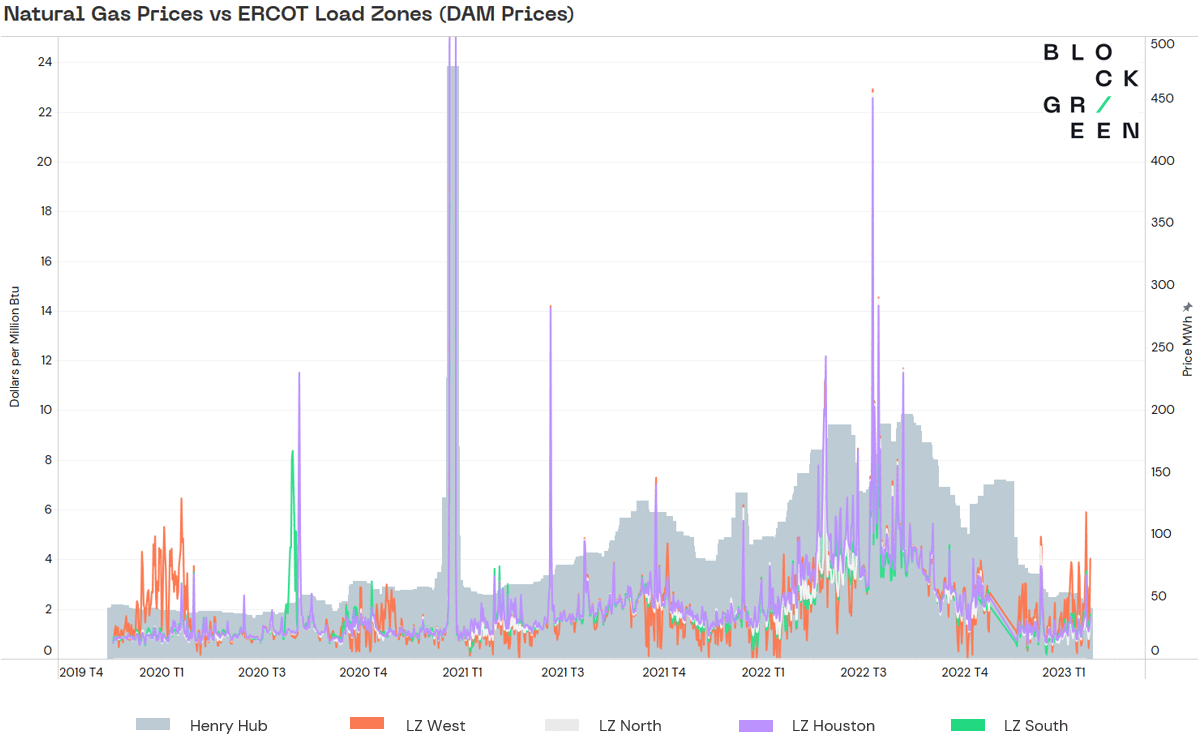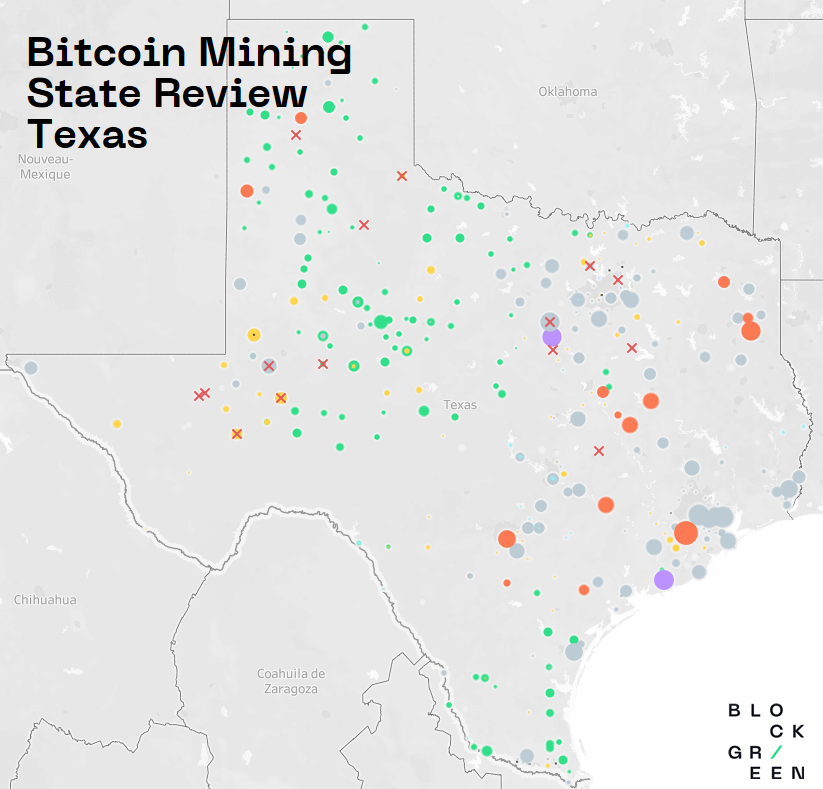- Block Green Industry Weekly
- Posts
- Bitfarms Farmed 424 BTC in March with 78% Growth YoY in Hashrate 👏
Bitfarms Farmed 424 BTC in March with 78% Growth YoY in Hashrate 👏
PLUS Iris and Terawulf March updates, Soluna's responds the White House and Texas anti-mining bill passes

Hi all and happy easter 🐥
In this newsletter, we summarize some of the big events from this week and will continue doing this weekly. Subscribe to get it straight in your inbox.
Don’t miss our latest report: The State of Mining - Texas

Block Green’s Bitcoin mining report is live with a focus on Texas, a deep dive into the pioneering mining market and its energy dynamics 💚
Here's what happened in the world of mining this week:
Iris Energy increased their hashrate by 79% 📈
Bitfarms mined 424 BTC in March 👏
Terawulf back again with 233 BTC in March 🐺
Soluna responds the White House request for information ✉️
Texas anti-Bitcoin mining bill unanimously passes committee vote ⤵️
Interesting comparison between EVs and Bitcoin 🔋
Like EVs, Bitcoin is a fully electrified, so they have no direct emissions
Like EVs, Bitcoin has indirect emissions from electricity was generated using fossil fuels
TL; DR: Bitcoin uses significantly more sustainable energy, and significantly less fossil fuel
— Daniel Batten (@DSBatten)
12:40 AM • Apr 6, 2023
Iris Increased Their Operating Hashrate by 79% 📈

Avg hashrate of 1,912 PH/s, 173 BTC mined, 4.3 MUSD revenue.
Iris Energy increased its operating hashrate by 79% to 3.1 EH/s and plans to reach 5.5 EH/s in the near future.
The electricity rate hike is expected to increase the company's all-in unit cost of electricity by about 2%.
Iris Energy's Canal Flats, Mackenzie, and Prince George mining projects in BC, Canada, achieved average monthly operating hashrate of 591 PH/s, 862 PH/s, and 458 PH/s, respectively.
600MW Childress substation nearing energization.
The company's upfront investment in key infrastructure at Childress provides the ability to rapidly and efficiently expand beyond the first 20MW.

Bitfarms Mined 424 bitcoin in March 🟠

Bitfarms' financial position improved in March due to stable production and rising BTC price.
Bitfarms mined 424 BTC, added 30 BTC to treasury, and sold 394 BTC at an average price of $24,700 per BTC.
Bitfarms increased BTC production by 17% YoY in March 2023, despite energy curtailment in Quebec and Paraguay and continued network growth.
The company ended March with $29 million in cash, 435 BTC in custody, $22 million in vendor credits, and $21 million in total indebtedness.
Bitfarms successfully piloted a new feature in its proprietary management system to track real-time energy consumption on an individual miner basis.
Bitfarms mined 1,297 BTC in the first three months of 2023, compared to 962 BTC in the same period in 2022.
Bitfarms sold 394 BTC, reduced outstanding indebtedness by $2 million, and held 435 BTC in custody and $22 million in credit for pre-paid deposits to be applied against future miner purchase agreements.
TeraWulf Self-Mined 233 BTC in March 🐺

TeraWulf, a bitcoin mining company, announced its March 2023 production and operations update.
The company increased its hash rate capacity by 65% in Q1 2023, reaching 3.3 EH/s as of March 31, 2023.
TeraWulf increased its bitcoin production by 63% month-over-month, producing 233 BTC in March and 533 BTC in Q1 2023.
The company continued its ramp at Nautilus, the first nuclear-powered bitcoin mining facility in the U.S., with over 1.2 EH/s of self-mining capacity deployed at the end of the month.
TeraWulf remains on target to achieve 5.5 EH/s and 160 MW operating capacity in Q2 2023.
Soluna Responds to White House Request for Information 📥️
Thank you for the opportunity to submit information for your Energy and Climate Implications of Digital Assets RFI. At Soluna Computing, Inc., our mission is to make renewable energy the next global superpower. We build modular green data centers to efficiently convert wasted renewable energy into global computing for digital assets. Below, we highlight some of the most important points from our RFI response.
Soluna’s letter from John Belizaire
In short:
Proof of Work (PoW) is fundamental to the security of the blockchain, but its energy consumption is a concern.
Crypto's energy use can be beneficial if data centers are designed to operate efficiently on green energy and can help stabilize the energy infrastructure.
Curtailment of renewables is a bigger climate challenge than crypto's energy use, and Soluna's data centers can help address this by matching intermittent power generation in real time.
Smart policy can incentivize renewables and clean computing by encouraging good behavior from data centers and crypto miners through tax credits and loan guarantee programs.
It’s worth a read - Soluna’s Medium
Texas Bill Limiting Benefits for Crypto Miners Unanimously Passes Committee Vote 👀

We mentioned last week that a Senate committee would vote on an anti-mining bill and it passed.
A proposed new law that could restrict key benefits for bitcoin miners in Texas passed a state Senate committee and is headed to the full chamber.
Senate Bill 1751 would cap miners' participation in grid ancillary services to 10% of the total participation and take away tax abatements for certain property.
Miners with more than 10 megawatts of computing power would have to register as large flexible loads operators with the Texas grid operator, ERCOT.
The bill is sponsored by three Republican state senators: Lois Kolkhorst, Donna Campell, and Robert Nichols.
Texas is one of the world's largest hubs for the energy-intensive bitcoin mining industry, and the proposed law could affect the industry's operations in the state.
North Carolina County Considers One-Year Moratorium on Mining 🛑

More negative regulatory news coming out of NC…
Buncombe County is considering a 1-year moratorium on new and existing Bitcoin mining operations to develop standards and mitigation methods for intensive land uses that may pose detrimental harm to the natural environment.
Buncombe County plans to classify cryptocurrency mining separately from data centers and restrict zoning certification permits for crypto mining until the moratorium is finalized.
The closer look is due to controversy in neighboring Cherokee County over the noise from mining operations.
Data 🌏️
MinerMag published the cost of Bitcoin production for Bitcoin miners in FY22

